Pandora Writer |
____________________
Steve McQueen, often referred to as "The King of Cool," was a Hollywood icon. His captivating performances, rugged charisma, and daredevil spirit made him a legend both on and off the screen. He was a man who defined cool in the turbulent era of the 1960s and '70s.
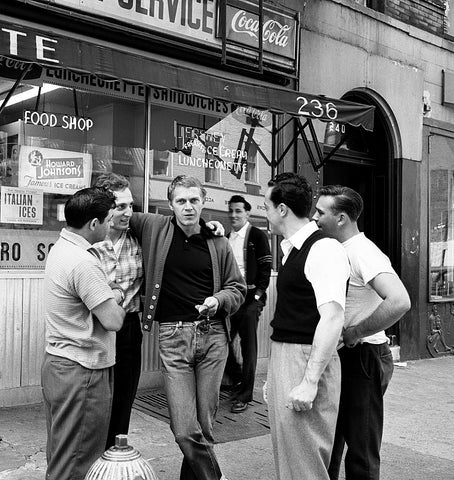
Steve McQueen, born Terrence Stephen McQueen on March 24, 1930, grew up in a troubled household. His father left the family when Steve was young, and his mother was unable to care for him, so he lived with various relatives and in foster homes. He had a difficult and rebellious youth, which included time spent in reform schools and occasional brushes with the law.
McQueen's life took a significant turn when he joined the U.S. Marine Corps at the age of 17. He served for several years, including a stint in the military police. It was during his time in the military that he discovered a sense of discipline and purpose. He later credited the Marines with teaching him valuable life lessons and providing the structure he had lacked in his youth.
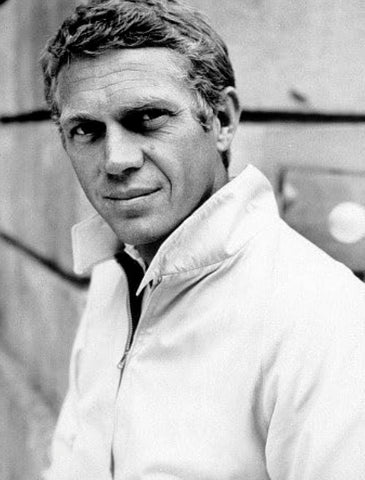
After leaving the Marines, McQueen began to explore acting, starting with small roles in television series. His rugged good looks and intense presence quickly caught the attention of casting directors.
In 1956, he was in "Somebody Up There Likes Me," alongside Paul Newman. Without receiving credit and appearing in his second film, McQueen played a minor role as one of Paul Newman's street-smart companions in the initial scenes of the movie. Fast forward two decades, and Steve would be prominently featured above Paul in the credits when they shared the screen in "The Towering Inferno" in 1974.
McQueen's breakthrough came in 1958 when he was cast in the lead role of Josh Randall in the TV series "Wanted: Dead or Alive." The show's success brought him recognition and popularity.
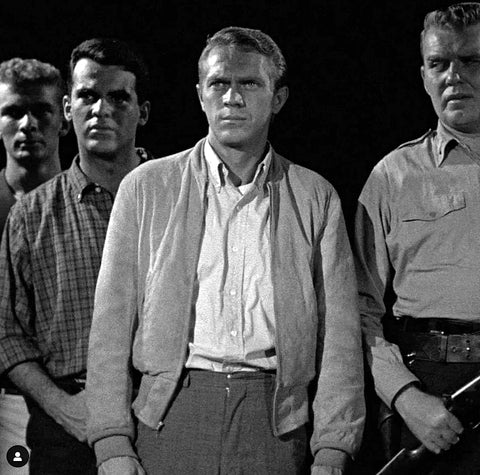
McQueen's success in television paved the way for a transition to film. He began appearing in feature films, with one of his early notable roles being in "The Magnificent Seven" in 1960. McQueen was also in the movie "The Blob" in 1958, where he portrayed a high school student who, alongside his girlfriend, ingeniously outsmarted a deadly extraterrestrial jelly-like creature.
He then starred in a series of acclaimed films, including "The Great Escape" in 1963, "Bullitt" in 1968, "The Thomas Crown Affair" in 1968, and "Papillon" in 1973, among others. His portrayal of the motorcycle-jumping Captain Virgil Hilts in "The Great Escape" became one of his most iconic roles.
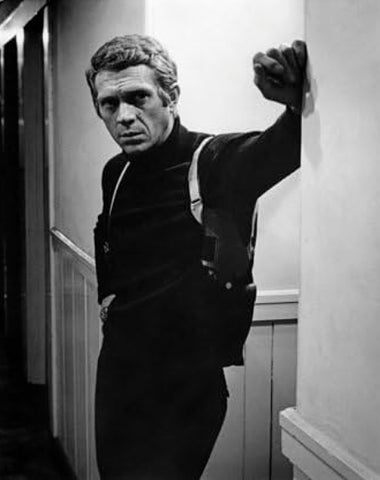
Throughout his career, McQueen was known for his ability to excel in action-packed roles. Despite his troubled youth, he worked hard to establish himself as a respected actor in the film industry and left a legacy as one of Hollywood's legends.
Steve McQueen was more than just an actor; he was a cultural phenomenon. His effortless style, characterized by tailored suits, classic cars, and an insatiable appetite for adventure, earned him the nickname "The King of Cool." He had a unique ability to convey emotion, captivating audiences with his authenticity.
McQueen's love for speed extended beyond the silver screen. He was an avid racer and motorcycle enthusiast, even competing in off-road motorcycle races. He competed in the 1964 International Six Days Trial in East Germany as part of the US team. McQueen also raced cars and was a regular competitor in the Sports Car Club of America (SCCA) events, often driving his powerful Porsche 908.
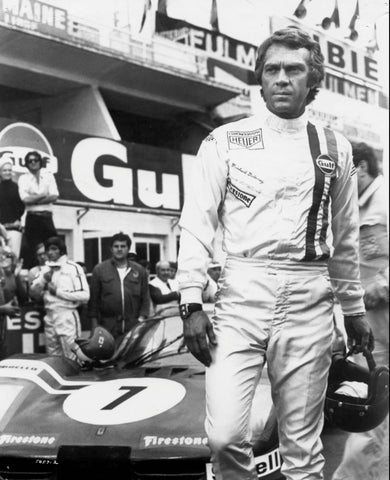
In 1971, McQueen starred in the movie "Le Mans," which was a tribute to the world-famous 24-hour endurance race held in France. The movie featured McQueen himself driving a Porsche 917K around the Le Mans track, and it is still regarded as one of the greatest racing movies ever made.
Despite his immense success, McQueen faced personal challenges. His marriages, particularly to actress Neile Adams and model Barbara Minty, were marked by turmoil. Substance abuse issues also plagued him at various points in his life.
Tragically, Steve McQueen's life was cut short. In 1980, he was diagnosed with terminal lung cancer, believed to be a result of his years as a heavy smoker. On November 7, 1980, he passed away at the age of 50, leaving behind a legacy that continues to influence actors and film lovers worldwide.
Steve McQueen's life was a journey of redemption, transformation, and triumph. From a troubled youth to becoming a cinematic icon, he personified the spirit of cool and captured the imagination of generations. His contribution to film and his legacy as "The King of Cool" remain eternally etched in Hollywood history.
-----------------------------------------------------------------------------------------------------------
Did you know?
Steve McQueen dreamed of being a professional race car driver.
He dropped out of school in ninth grade.
McQueen started his acting career by taking acting classes at the Actors Studio in New York City. He also studied with renowned acting coach Sanford Meisner.
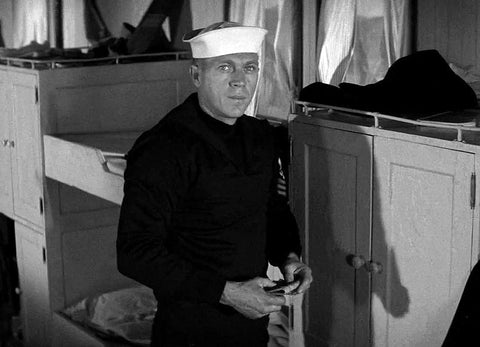
The Sand Pebbles in 1966 was filmed across Taiwan and Hong Kong, with production spanning a lengthy seven-month period. McQueen's outstanding performance in the film resulted in his sole Academy Award nomination during his career.
Steve’s first wife, Neile Adams, said in an interview, “He had this competitiveness with Paul Newman because Paul had become a star in ‘Somebody Up There Likes Me.’ And Steve had a very minor part. It took a long time to catch up with Paul. It took 18 years, until ‘The Towering Inferno’ when he finally had his name first. Paul's name was a little higher, but it didn't matter, he was first. After this film, he was exhausted and wanted to retire.” In an interview Paul Newman said that he “came to regret his choice to share the screen with Steve McQueen due to the intense rivalry that developed between them.” McQueen received equal compensation: $1 million plus a 10% share of the box office earnings.
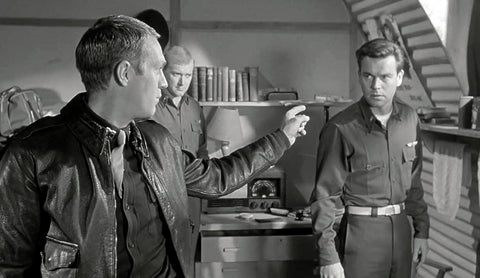
Steve engaged in a notorious dispute with his neighboring British rocker, Keith Moon, famously known as "Moon the Loon" from The Who, while residing in Malibu. Moon had a habit of leaving his bathroom light on during the night, which cast an annoying glow directly into McQueen's bedroom, disrupting his sleep. Despite McQueen's repeated requests for Moon to turn off the light, his request was ignored. In frustration, McQueen resorted to an unconventional solution, grabbing a shotgun, and with a blast, he extinguished the bothersome light before returning to bed.
On August 8, 1969, McQueen had received an invitation to dine at the home of Roman Polanski and Sharon Tate in the Hollywood Hills. However, an unexpected encounter with an unknown woman led McQueen to cancel his dinner plans. Little did he know that this decision would later take on a chilling significance.
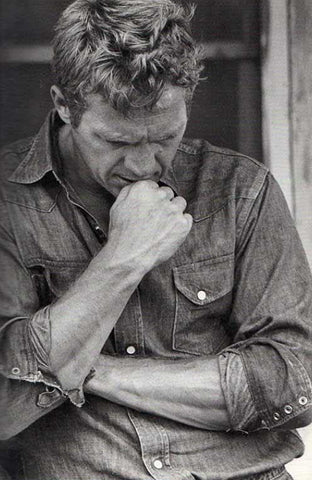
In the aftermath of the tragic Manson Family murders that night of the dinner, McQueen discovered that he had been placed at the top of Charles Manson's infamous celebrity death list. This revelation left him deeply unsettled and apprehensive. Consequently, McQueen began carrying a concealed weapon for personal protection in response to this unexpected threat. Dominick Dunne said, "Steve McQueen packed a gun when he went to Jay Sebring's funeral (Jay was at the house that night and was murdered along with four others.)."
McQueen made an appearance on the popular television game show "What's My Line?" in 1966. "What's My Line?" was a panel game show where guests would appear, and the panelists would try to guess the guest's occupation or identity by asking a series of yes-or-no questions. During the show, Arlene Francis eventually figured out that he was Steve McQueen. It aired on December 18, 1966. Sadly Dorothy Kilgallen wasn't in this episode as she had died a year earlier.
McQueen was posthumously awarded a Star on the Hollywood Walk of Fame at 6834 Hollywood Boulevard on June 12, 1986.
“You only go around once in life and I'm going to grab a handful of it.” – Steve McQueen
